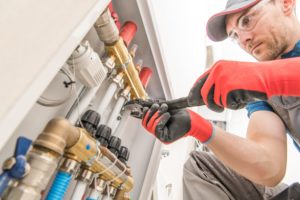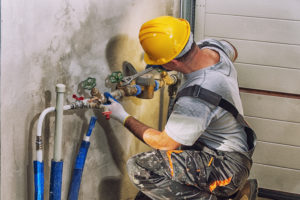 Like other emergencies, plumbing emergencies are also unpredictable and damaging. With a bit of knowledge on how to prevent such instances, you may rest assured, knowing your plumbing isn’t at risk.
Like other emergencies, plumbing emergencies are also unpredictable and damaging. With a bit of knowledge on how to prevent such instances, you may rest assured, knowing your plumbing isn’t at risk.
In this article, you’ll find some tips to avoid plumbing emergencies. But before diving into the tips, discussed below is the definition of a plumbing emergency. Read on and get enlightened!
What Is A Plumbing Emergency?
A plumbing emergency can range from minor to major issues, which may cause great damage if unnoticed or not fixed immediately. For instance, a small crack or leak going without being noticed can turn into a disaster that’ll require the help of a professional plumber.
If you’ve just noticed an alarming plumbing issue that’s been going on for quite some time already, don’t worry. Reliable plumbing companies such as emergencyplumbingsquad.com have specialized in ensuring that all your plumbing problems are addressed and resolved. To prevent these issues from happening again in the future, follow these tips below.
- Maintain The Good Condition Of Your Pipes
 Pipes don’t last forever. With time, they get damaged due to corrosion and rust. So, older pipes will require extra care and maintenance (including repiping) to avoid bursts and leaks.
Pipes don’t last forever. With time, they get damaged due to corrosion and rust. So, older pipes will require extra care and maintenance (including repiping) to avoid bursts and leaks.
Weather condition is another factor of pipe damage. Cold weather might cause pipes to contract and then crack, which may lead to flooding. This kind of damage can be prevented by keeping the thermostat at consistent temperatures or keeping the heat on during winter.
- Safeguard Your Heater Tank
To avoid leakage in your water heater tank, inspect it more frequently and rectify the issue if any. In doing so, you’ll be prolonging your water heater’s lifespan, which could be expensive to replace if broken. Drain your water heater tank more often to ensure that water quality is good and free from debris and sediment.
- Install A Sump Pump
Do you live in a location where natural disasters such as flash floods and hurricanes are the order of the day? If so, then you should go the extra mile in protecting your home in case these unavoidable weather conditions occur.
Sump pumps are usually installed in the lowest level of a house or building, where water will first accumulate during a flood. It’s designed in such a way that it pumps out water before it starts flooding. Sump pumps are usually used in areas prone to floods. They send water away from home, thus reducing the occurrence of floods.
Sump pumps will save your home from being destroyed by floods. Consider installing one in your home to prevent water from seeping into your home’s foundations every time heavy rains and flooding occur.
- Sustain Your Septic Tank System
Failing septic tanks is one of the worst plumbing emergencies you can ever face. The septic tank is a vital part of a home’s plumbing system. It receives wastewater products from the house or any other structure and disposes of them to the treatment field. When your home’s plumbing system requires attention, trust the expertise of well service Indianapolis to ensure optimal functionality and water flow.
Even with regular pumping, solids and debris might still build up over time, thus causing a blockage in the soil pipes. This blockage can be prevented using high-pressure water jetting, which can be done every after five years.
To break down the building up of detergent products and unnatural soap, you can consider adding live bacteria to your septic tank system. Bacteria will keep your septic tank from overfilling. They eat solid waste products and convert them into liquids or gases. This will improve the ability of the septic tank system to function properly. The septic tank system needs to be assessed and pumped regularly to prevent any plumbing emergencies from arising.
- Avoid Using Drains As Trash Cans
Toilets and garbage disposals are designed and meant for the disposal of specific waste products. Therefore, you shouldn’t just dispose of all your waste products through them. If you improperly use them, they’ll get clogged up.
As you may have witnessed at your home, most plumbing emergencies happen due to mistreating the plumbing system. Ensure you avoid disposing of items like cotton wools, wipes, tissues, pads, and cotton swabs through the toilet system. Only human waste should go through the water closet down to the septic tank.
- Avoid Fixing An Issue You’re Not Familiar With
Small bursts and leaks can be worsened by repairing them by yourself, especially if you’re not familiar with the proper handling of the affected part of the plumbing system and fixing the issue. If you don’t have experience in plumbing, it’s good to engage a professional plumber instead.
A qualified plumber will have all the skills required to rectify an issue in your plumbing system. You can also seek some advice from a plumber on how you can prevent plumbing emergencies from occurring in the future. Save yourself the hassle and engage them instead of making things worse by ignorantly fixing it.
Conclusion
In conclusion, whether you’re a homeowner or a tenant, whether you reside in a house or an apartment, or whether you live in a remote area or an urban settlement, you’ll be doing yourself a great favor when you take precautionary measures to maintain your plumbing system properly.
Updating your plumbing as needed and maintaining it appropriately won’t only save your money and time but will also prevent the hassle of dealing with leaky pipes, flooding, broken fixtures, or finding a professional plumber, in case a plumbing emergency arises.
